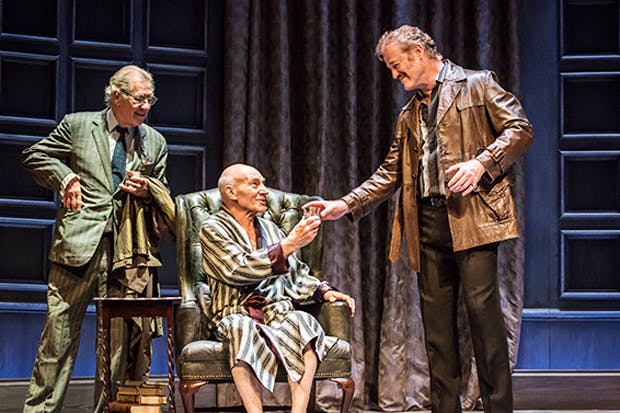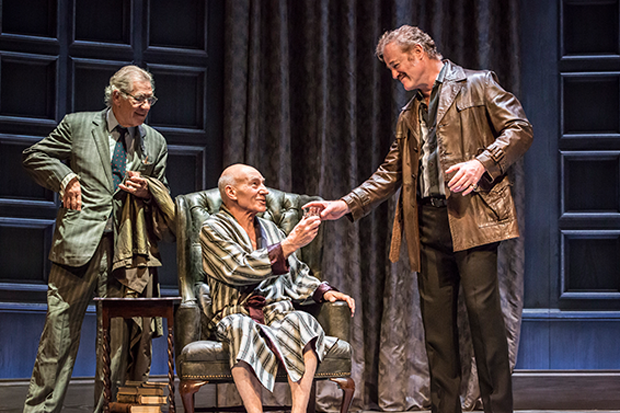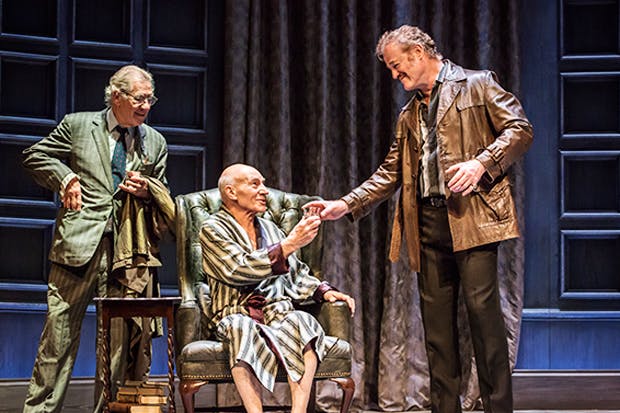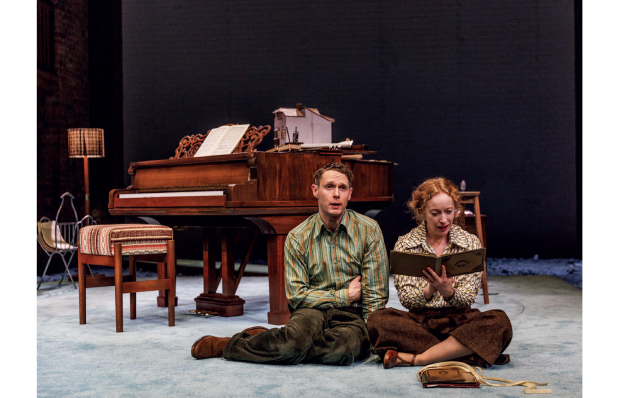No Man’s Land isn’t quite as great as its classic status suggests. At first sight the script is a bit of a head-scrambler because Pinter’s characters are obscure to the point of incoherence. A demented alcoholic, Hirst, is cared for in his Hampstead mansion by two mysterious thugs, or servants, who may be emeritus rent boys and who are, or perhaps were, romantically linked to one another. Into this mysterious triptych comes Spooner, a simple and fascinating creation, a washed-up Oxford poet of high intelligence and low achievement who lives by cadging favours from kindly Hampstead folk. He wheedles his way into Hirst’s affections in the hope of gaining employment as a secretary, companion, literary consultant, cleaner, house-pianist, or anything. Hirst’s cocky employees try to bully him off the premises and Hirst’s amnesia makes his bid for recruitment an impossibility.
After the interval, Hirst is reborn as a new character. Suddenly, he’s a charming and gallant millionaire brimful of stories and reminiscences who instantly recognises Spooner as an old varsity rival and engages him in a battle of competitive anecdotage about their romantic conquests, often achieved at each other’s expense. These passages of offbeat swordplay are a treat to witness. But whenever the rent boys pipe up the dramatic tension is lost and the audience fidgets. And the shape-shifting dialogue is interspersed with crass soliloquys about ‘no-man’s-land’ being a place of coldness, silence, emptiness, and so on, which (let’s be honest, Lady Antonia) belong in Poetry Corner.
The show needs two world-class actors of equal potency and it’s a genuine thrill to see Patrick Stewart and Ian McKellen taking each other on at full force. Hirst, afflicted with dementia, sits ramrod straight in his armchair, whisky in hand, saying barely a word but exuding an unfathomable menace. Even Stewart’s head, that great shaven orb, manages to be enigmatic. Ian McKellen’s dainty, effeminate Spooner minces about with a twinkly knowingness. His clowning as he tiptoes to the whisky cabinet falls just short, but only just, of self-parody. He’s probably aware that the play can’t work as burlesque but must retain the authentic atmosphere of confusion and despair. Director Sean Mathias can be proud of a production that is often hilarious, sometimes puzzling, and only seriously boring for about half an hour.
The Rose Theatre Kingston has scored a triumph by attracting John Malkovich to direct a newish play about New York publishers. Annie is a bulimic rape victim, permanently high on speed, married to Jack, a kind-hearted bore who writes unexpectedly good novels. At a party for Manhattan’s literary elite Annie gets drunk, goes bananas and attacks America’s leading book reviewer with her frail little fists. The starched-shirt publishers throw a strop and kick the couple out. Annie is informed that her pugilistic endeavours may have wrecked Jack’s career.
Sorry. Hang on. What was that? A real publisher would regard a talented novelist with a violent and unstable wife as a glorious marketing opportunity. Has he not heard of Scott and Zelda? Likewise, a book reviewer physically assaulted by an author’s wine-crazed spouse would exploit the scuffle relentlessly to boost his profile and his fees. But in this play the two literary titans respond to Annie’s wimpy little swats like a couple of panicking prefects going nuts because a kid threw a stink bomb.
The illogicalities continue. Nice boring Jack decides to terminate Annie’s addiction by paying her supplier $12,000 in return for a promise (made presumably on the strength of his unchallenged dominance of the world drug-trade) that no illegal powders will ever again reach her hands. Poor demented Annie, unable to escape her traumatic childhood, declares herself the true author of her husband’s books. (Again, a golden commercial opportunity regarded by the characters as a shameful secret.) When the waffling misery guts attempts suicide, she doesn’t use chemicals, as any streetwise druggie would, she turns instead to the most painful and unreliable materials available: cleaning fluids. But forget the truth, look at the stage picture. Bottles of squirt lined up on a desk with the victim glugging at them hysterically before collapsing on the floor, twitching and jabbering, in a big foaming pink heap of regurgitated Windolene.
Malkovich’s direction is full of facile symbolism. Annie delivers some of her lines while crossing an imaginary tightrope to remind us she’s around the twist. Yes, we’d noticed. At the publisher’s party, the male characters stroll in circles like donkeys with BSE. The back wall becomes an idiot board where emblems of falling pills inform us that amphetamines are among the play’s leitmotifs. OK, no need to tell us twice. If only the great Michael Simkins were available to anatomise the crass pretensions of this dim muddle. Unfortunately, he’s in it (in a nothing role) as a back-slapping millionaire. We’ll have to wait for his next volume of memoirs.
Got something to add? Join the discussion and comment below.
Get 10 issues for just $10
Subscribe to The Spectator Australia today for the next 10 magazine issues, plus full online access, for just $10.














Comments
Don't miss out
Join the conversation with other Spectator Australia readers. Subscribe to leave a comment.
SUBSCRIBEAlready a subscriber? Log in